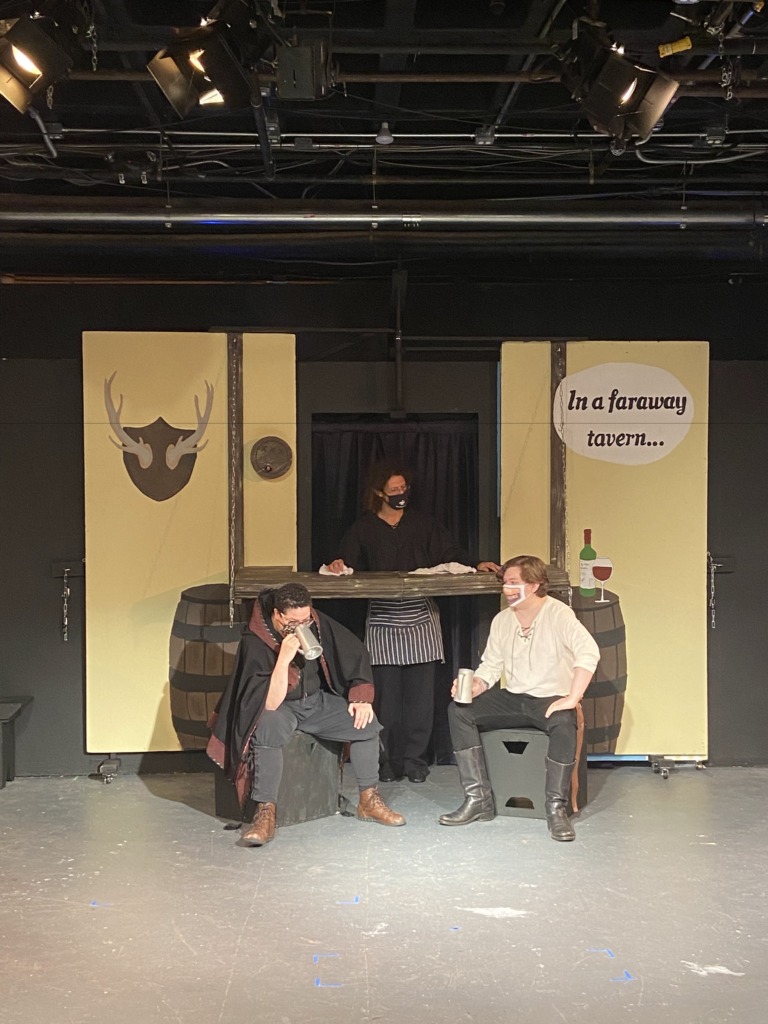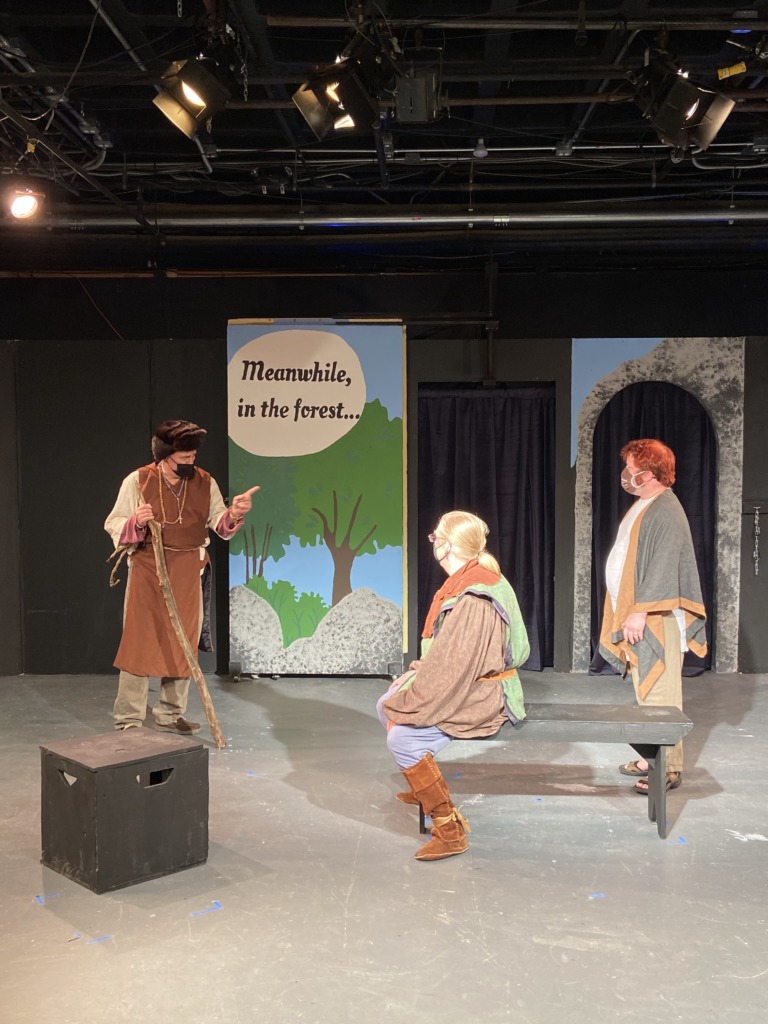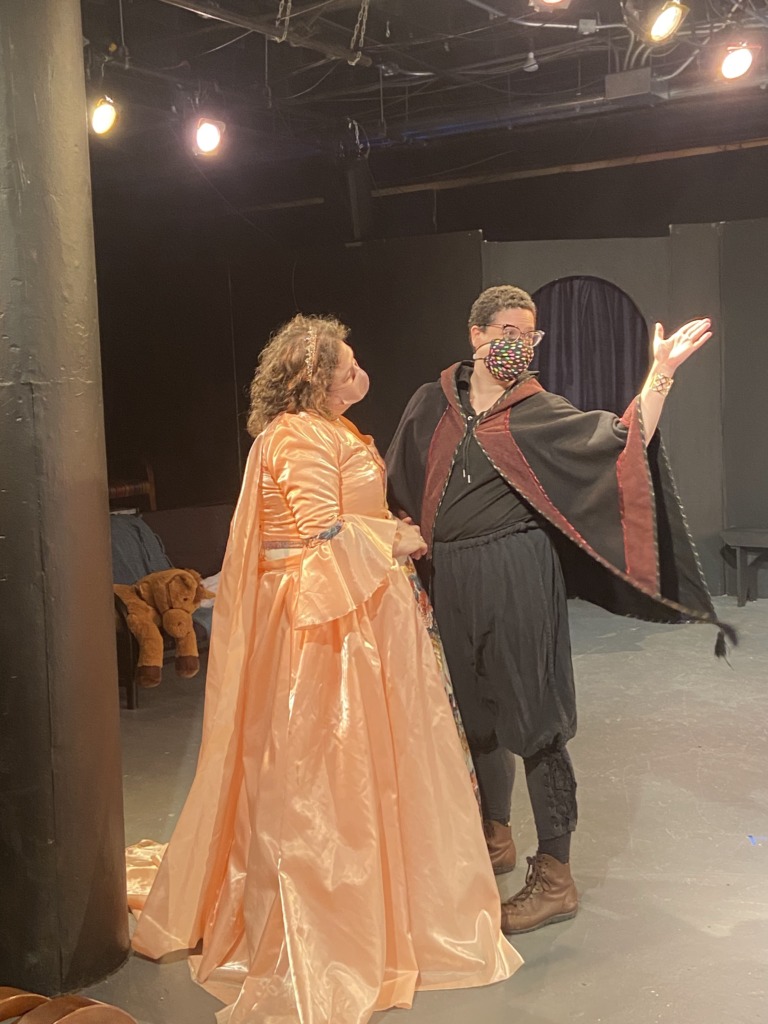Hello.
My name is Amanda Gunther.
You killed all 37.
Prepare to be reviewed.
Going out with a rather impressive bang— though by no means are they finished producing or existing— The Rude Mechanicals, now in full-time residence at The Greenbelt Arts Center, have attained one of their coveted company goals: Produce all 37 of Shakespeare’s plays. Cymbeline, Directed by Erin Nealer, completes the quest of all 37. And what if they wished to frame it up with a little iconic movie like The Princess Bride? Well… as they wish!
In what appears to be a cumulative effort of the cast & crew (inconceivable!) there is a rather impressive yet simplistic set concept at work for this production. ‘Book Binder’ Alan Duda (who turns the pages of the narrative in a trifold fashion, upon which I’ll elaborate. Later.) puts his storytelling charm into literal practice by popping up to ‘turn-the-pages’ of the enormous storybook set piece, which serves as the backdrop and scenery for this otherwise minimalist, imaginative setting. The storybook, as a functional set mechanism, is both ambitious and clever. Director Erin Nealer has used The Princess Bride as a lens through which to view the show, this gigantic storybook ties into that concept sublimely. (Book-Binder Duda and Bartender, played by Joshua Engel, even have a repartee of “See you next time” & “I’ll be here” whenever the ‘book is closed’ upon the tavern scene.)

Supporting this impressive set piece and vice versa, is the visionary setup that Nealer has put forth for the overall production. The Rude Mechanicals are well-known for rendering Shakespeare’s works down to the essence and their production of Cymbeline is no exception. The play opens with Papa (Alan Duda) crossing the empty stage (save for the unopen storybook) to check on Kid (Stephen Duda…who should have been credited as Stephicorn, as he wears the most awesome unicorn-pajama-onesie), who is home recovering from receiving his Covid-19 vaccine. (Sounding familiar? Kid home sick in bed…grandfather figure comes to read him a story…inconceivable!) This framework— Papa telling the story of Cymbeline to Kid— mirrors The Princess Bride while simultaneously rendering out all the lengthy, boring, and otherwise unimportant bits of this particularly obscure Shakespearean— tragi-comi-histor-problem play. There are even interruptions from the Kid (Stephen Duda) when he wants to ‘get to the action’ or ‘skip over the boring history bits.’ To Duda and Duda’s credit, both play their roles well. Alan Duda keeps his head down in the prop storybook he’s holding (except when he’s up turning pages on the enormous book to shift the scene) and Stephen Duda watches what’s happening on stage with rapt attention, as if he were really imagining the story and making it come to life before our very eyes.
Another non-specific cumulative effort on behalf of the cast and crew (inconceivable! Yes…I keep using that word…and perhaps it does not mean what I think it means?) is the overall sartorial selection— aka the costume design— for the show, which for this production, includes the use of brightly saturated face coverings (in compliance with local town regulations for caution during the on-going Covid-19 Pandemic.) But not only is the cast appropriately masked— their masks HAVE CHARACTER NAMES ON THEM. Despite my well-versed knowledge of Cymbeline (your average theatergoer likely hasn’t hard of this one, let alone seen it thrice prior like I have), there was a true usefulness in having these three-inch high block lettering names tattooed on the masks. Shakespeare can be confusing enough, particularly when characters start being who they are not (which is basically every Shakespearean play ever— why are all of Shakespeare’s characters so gullible and angsty!?), so this ‘name-identification-system’ is both helpful and protective! Masks aside, the general feel of the costumes is period appropriate and some are downright dazzling. Both the regal outfit on the queen (Boo! Hiss! What? It’s an evil character! The Ancient Booer told me so!) and the fabulous peach-apricot floral affair featured on Imogen completely steal the audiences’ attention and well-fit the era of play for the play. (It is worth noting that waaay deep down in the program bios that Linda “Spencer” Dye gets credit as Costumer for this production. That exchange needs to go down like this. “Hello. My name is Linda “Spencer” Dye. I costumed this show but you didn’t put me on the title credits page. Prepare to die.”)
Mentioning the masks deserves all the praises to the players because never once was there a difficulty in understanding their words or hearing their dialogue. Performing in masks is a challenge that a great many in the theatre community have struggled with as we all navigate the waters of ‘new-normal’ on this side of the Pandemic. The Rude Mechanicals have mastered doing so and have brilliant projection (without microphones, its worth noting) and articulation despite the face coverings. Director Erin Nealer has worked exceptionally hard to give her cast a gripping handle on Shakespeare’s archaic wording and not only is it delivered with emphatic emotion, but it is delivered crisply, clearly, and soundly without dampening despite masks in place at all times. Inconceivable!
Everyone in the 15-person ensemble has a moment that really catches the audiences’ attention, whether its Sam Kopel in an almost silent, walk-on role as Caius Lucius (that would be the boring history bit that Kid & Papa decided to summarize and mostly skip over) or Bartender Joshua Engel who has very few lines but feels engagingly present and gets his kicks in when bantering with our Book Binder during the scene changes. (You’ll also note- though the program fails to denote a sound designer…not even deep in the bowels of the cast-crew bios…that there are musical snippets and interludes that are quite familiar if you have any familiarity whatsoever with The Princess Bride.) Even the meddlesome Queen (Melissa Schick), whose existence has been reduced to lots of hilarious and well-executed pantomimed, background actions— much of which includes her ‘enchanting ring’— finds her moment in the limelight, and simply stuns in that gorgeous dress.

The delightful Mountain Men— Belarius (Bill Bodie), Guiderius (Sean Eustis), and Arviragus (Will Robey) are quirky, adorably off-beat characters that the audience doesn’t get to meet until the second act, but they still make their presence felt, particularly Sean Eustis in his role of Guiderius. There probably shouldn’t be a lot of expounding on exactly who Belarius, Guiderius, and Arviragus actually are (as it’s both a major plot point and… Spoilers…) but suffice it to say that Bodie, Eustis, and Robey do a fine job delivering their dialogue with readily accessible Shakespearean patois. Keep an eye out for Eustis’ ‘head-rolling’ scene; it’s rather humerous.
Like so many of the Bard’s great works…or at least like Julius Caesar… the play of Cymbeline has very little to do with the actual character of Cymbeline, played with refined hilarity by Jaki Demarest. (This might be a muddled and slightly inaccurate statement— the bit about ‘not being about Cymbeline— but as the audience will discover, it’s much more about the world of Imogen, Posthumus, and all the shenanigans that go into duping, slandering, running-away-and-disguising characters…as so often is the case in basically any Shakespearean play ever.) Demarest nestles into the age of the character divinely, making true comic gold out of her squeaky bones and overly exaggerated decrepit and aged physicality. (While you don’t get to see the fully-printed woolly beard mask beneath the mask that says ‘Cymbeline’, it ties right into the wooly knitted hat and other bits of the kingly costume superbly.) Watch Demarest’s Cymbeline get up and down from sitting to standing and enjoy yourself a good chuckle at her commitment to the character’s physicality.
It’s never a Shakespearean play without servants or other side-boosting characters who appear to exist solely to convolute the plot, royally muck things up by mixing up this or accidentally doing that, and of course Cymbeline is par for the Bard’s course in that regard. There’s the doctor character, Cornelius (Liana Olear) who spends a bit of time attempting to verbally comfort Posthumus after his banishment. (Of course there’s banishment! It’s a Shakespeare featuring royals! Someone has to be banished— so says the Bard!) But Olear’s true shining achievement is her brilliant soliloquy (a monologue addressed specifically to the audience for the sake of giving the audience some detail or other that no one else on stage will have or know, unless some sneaky character is nearby eavesdropping.) There is a radiant sense that Olear is confessing a major detail— perhaps that her Doctor subscribes to the same pharmaceutical college of R+J’s Friar Lawrence (nudge-nudge, wink-wink)— and the clarity of her soliloquy feels like its spoken specifically and directly just to you, the individual audience member.
Pisanio (Sarah Pfanz) is your stereotypical servant in any Shakespeare play. There’s even a tiny stringed instrument. (Ukulele, lute, mini-stringy-thingy…take your pick.) Pfanz is nimble of foot and of mouth when it comes to delivering all of her character’s lines in exacting, emotional detail. Often Shakespeare’s servant characters have a great deal of moral-muddling to do; Pfanz does that delightfully when the ‘devious deception’ all goes down. Her understanding of comic nuance is impressive as well, particularly when she walks into one of the bawdier passages penned into the dialogue— has this epic comedic pause— and nope’s it right back off stage.
Let it never be said that Posthumus will not be heard through cloth face-covering barrier, even in moments of murmured upset or devastatingly mushy expressions of love. Erin MacDonald, tackling the role of the banished-deceived-and-returned (inconceivable!) lover-esque nobleman, with whom dear Imogen is in love, brings forth the volume, the emotion, and the Shakespearean intent full stop. MacDonald is a triple threat in that regard. MacDonald and Imogen (KatieWanschura) make a brilliantly sappy pair when it comes to sharing their gushy sentiments of being smitten with one another as well.

Katie Wanschura delivers the most mercurial performance of the production, giving us a delicately balanced portrayal of Imogen caught halfway between this fantasy world of The Princess Bride and all of its caricature-like characters and a woebegone, real Shakespearean princess. There are utterly maddening moments when Wanschura is going through some outlandish emotional experience or other and she delivers these feelings so soundly that you want to fly out of your seat, leap onto the stage, shake her about and scream, “It’s not worth it! No Prince/Lord/Love Interest” is worth all that!” (Please do not leap out of the audience. Inigo Montoya will slay you. Prepare to die.) Wanschura puts Cloten on blast with a fiery temper befitting any enraged princess when it comes to rejecting the character’s sorry ass and it just tickles the audience to see her so riled up (and in this instance with a good and purposeful reason.) She’s a bubble of energetic Shakespearean excitement and its delightful to see this in a character that could too easily be written off as ‘buttercup-y, whiny princess.’
Ironically enough the two most enjoyable parts of the performance (aside from all of it; all of it was enjoyable. Even the potty-break request from Stevicorn— The Kid who’s hearing this story narrated as if he’s the kid in The Princess Bride— which brings forth the intermission) are the two ne’er-do-well antagonists Cloten (Spencer Dye) and Iachimo (Evan Ockershausen.) Spencer Dye’s Cloten is a scream. The audience quickly hates this clot of a character who is pompous, obnoxious, and downright peevish. Dye carries the character with a load of misplaced self-importance and it creates a natural humor and distaste for Cloten, which makes the character’s heady ending that much more satisfying.
Evan Ockershausen is that villainous fiend we all love to hate. Charming, unctuous, sickeningly charismatic, and just downright nefarious. Ockershausen’s Iachimo is slick and revoltingly insincere in that way that all of Shakespeare’s ingenues fall for in a flash. His delivery of text is oiled better than greased-lightning and his antics with the box in the bedroom are classic comic villainy. Loaded with machismo when it comes to showing off in the ‘tavern’ in front of Posthumus, Ockershausen’s Iachimo doesn’t miss a chance to dig his saucy heels into the muddle he’s created.
In the end, all’s well that ends— well…that’s another story. But as I have outstood my time, I shall say this: for a cast whose faces are three-quarters obscured by masks, never once does the emotional expression or audible sound of this play suffer. Body language, active eyeballs and projecting voices make this play thoroughly enjoyable as well as understandable. It’s a brilliant, five-star production from The Rude Mechanicals, this Cymbeline is. I know, I know… INCONCEIVABLE!
Running Time: Approximately 1 hour and 45 minutes with one intermission
Cymbeline plays through November 7, 2021 with The Rude Mechanicals, now in residence at Greenbelt Arts Center— 123 Centerway in downtown Greenbelt, MD. For tickets call the box office at 301-441-8770 or purchase them online.
PLEASE NOTE:
- Tickets are only available in advance online; there will be no ticket sales at the door.
- The closing performance on Sunday November 7, 2021 is at 8pm. There is NO matinee that day.
- Be prepared to show proof (paper or digital) of vaccination at the door. No exceptions.
- Face masks must be worn at all times while in the building. No exceptions.
- For further information on GAC’s Covid-19 policies, click here.

